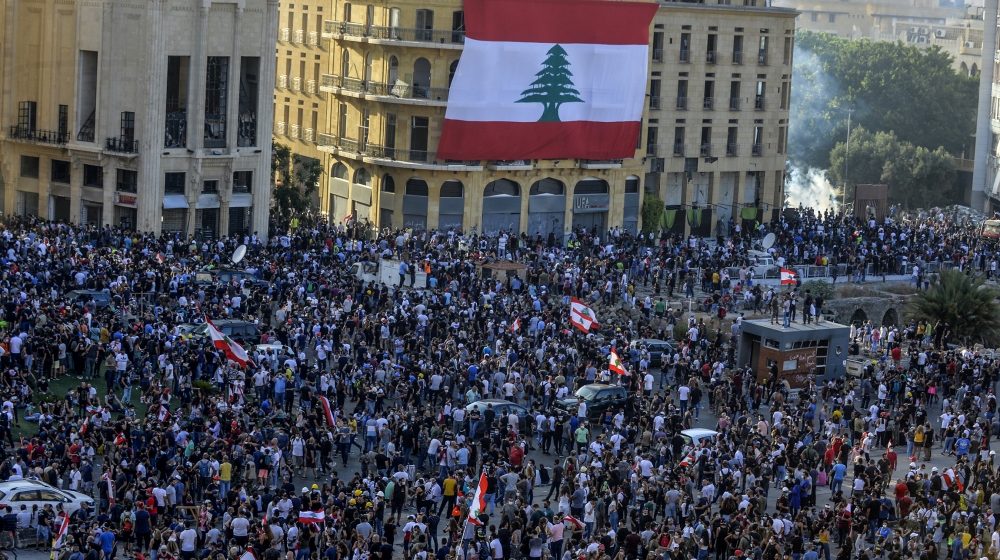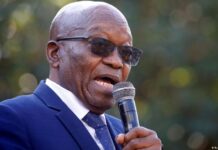Funds pledged at virtual conference to go towards aiding recovery in healthcare, food security, education and housing.
A host of nations have pledged nearly $300m in humanitarian assistance to Lebanon at a conference aimed at rallying international support for the crisis-hit country days after a debilitating explosion in the capital, Beirut.
In a joint statement after Sunday’s virtual event, the donor countries said the financial aid will be “directly delivered to the Lebanese population” and offered support for an “impartial, credible and independent inquiry” into Tuesday’s disaster that killed more than 150 people and wounded some 6,000.
The office of French President Emmanuel Macron, who led the conference, said the meeting raised pledges worth almost 253 million euros ($298m). In his opening remarks, Macron said the funds would primarily support healthcare, food security, education and housing.
“The Lebanese authorities must now implement political and economic reforms demanded by the Lebanese people and which alone will enable the international community to act effectively alongside Lebanon for reconstruction,” Macron said.
France has organised four donor conferences for Lebanon in the last 20 years where more than $20bn was pledged, mostly conditional on reforms that were not implemented.
Lebanon today is suffering from a major economic crisis and a growing coronavirus outbreak as well as the devastating aftermath of Tuesday’s explosion that left up to 300,000 people homeless.
At Beirut’s port, the epicentre of the explosion, grain silos were eviscerated while hospitals and schools across the city were destroyed.
Thousands take part in Lebanon's anti-gov't protests — in pictures https://t.co/Rcle1D8t5z pic.twitter.com/T18590xaNt
— Al Jazeera English (@AJEnglish) August 9, 2020
Some 36 countries and international institutions participated in Sunday’s online conference, which was held under the auspices of the United Nations and whose attendees included US President Donald Trump, Qatari Emir Sheikh Tamim bin Hamad Al Thani, Jordanian King Abdullah II and Egyptian President Abdel Fattah el-Sisi.
Pledges included 63 million euros ($74m) by the European Commission; 50 million from France ($59m); $50m from Qatar; $41m from Kuwait, $26m from Denmark; $20m from Germany; five million euros ($5.9m) from Cyprus and $5m from Canada. Other nations have previously pledged aid, including the United States with $17m.
The sums will be routed through the UN, international organisations and NGOs, rather than the Lebanese government – in line with the demands of large swaths of the Lebanese public who fear the funds would be lost to corruption.
Macron said the assistance would be closely monitored by the UN and come with support for an “impartial, credible and independent investigation into the causes of the disaster” at the port.
“It is a strong and legitimate demand of the Lebanese people. It’s a matter of confidence and the means are available and must be mobilised,” he added.
The French president also reiterated calls made during a visit to Beirut earlier this week for reforms to Lebanon’s crippled energy sector – which bleeds up to $1.5bn per year – in addition to the public procurement system, fighting corruption and auditing the central bank and the financial sector.
“It is up to the country’s authorities to act so that the country does not sink and to respond to the aspirations that the Lebanese people, legitimately expressed at this very moment in the streets of Beirut,” Macron said. “We must all do everything together so that neither violence nor chaos can win.”
The conference came as angry protesters took to the streets of Beirut for a second consecutive day on Sunday, clashing with security forces who fired tear gas to disperse the crowd.
The Lebanese Red Cross and the Islamic Emergency and Relief Corps said 728 people were wounded at Saturday’s large protest when security forces used tear gas, rubber bullets and, in a number of cases, shotgun shells containing metal pellets.
Thousands take part in Lebanon's anti-gov't protests — in pictures https://t.co/Rcle1D8t5z pic.twitter.com/T18590xaNt
— Al Jazeera English (@AJEnglish) August 9, 2020
Many Lebanese blame the country’s ossified political class for the horrific explosion on Tuesday. Some 2,750 tonnes of highly explosive ammonium nitrate had been stored at Beirut’s port for more than six years, with a range of security forces, the judiciary and politicians having knowledge of their existence but failing to act to mitigate the danger.
As fury boils over, Lebanese have taken to sharing pictures of nooses, implying the execution of politicians, and on Saturday staged a mock execution of the country’s political leaders at Martyrs’ Square, in central Beirut.













![Hotstar Premium Cookies 2019 [*100% Working & Daily Updated*] Hotstar Premium Cookies 2019 [*100% Working & Daily Updated*]](https://tahav.com/wp-content/uploads/2019/11/Hotstar-Premium-Cookies-Free-100x70.jpg)



